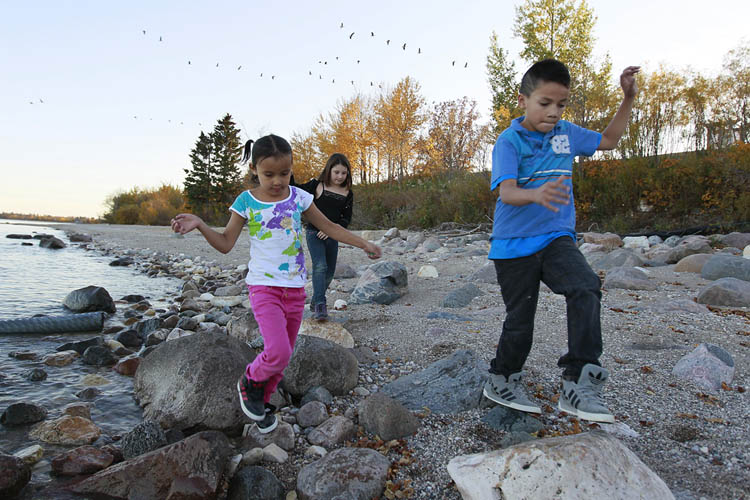Flood evacuees at Misty Lake Lodge despite pay dispute
Aid group won't cover bills of 18 aboriginal flood victims
Advertisement
Read this article for free:
or
Already have an account? Log in here »
To continue reading, please subscribe:
Monthly Digital Subscription
$0 for the first 4 weeks*
- Enjoy unlimited reading on winnipegfreepress.com
- Read the E-Edition, our digital replica newspaper
- Access News Break, our award-winning app
- Play interactive puzzles
*No charge for 4 weeks then price increases to the regular rate of $19.00 plus GST every four weeks. Offer available to new and qualified returning subscribers only. Cancel any time.
Monthly Digital Subscription
$4.75/week*
- Enjoy unlimited reading on winnipegfreepress.com
- Read the E-Edition, our digital replica newspaper
- Access News Break, our award-winning app
- Play interactive puzzles
*Billed as $19 plus GST every four weeks. Cancel any time.
To continue reading, please subscribe:
Add Free Press access to your Brandon Sun subscription for only an additional
$1 for the first 4 weeks*
*Your next subscription payment will increase by $1.00 and you will be charged $16.99 plus GST for four weeks. After four weeks, your payment will increase to $23.99 plus GST every four weeks.
Read unlimited articles for free today:
or
Already have an account? Log in here »
Hey there, time traveller!
This article was published 06/10/2012 (4774 days ago), so information in it may no longer be current.
A RESORT near Gimli has become an oasis for First Nations flood evacuees trying to get their kids away from crime and gangs in Winnipeg.
“People do feel quite comfortable here,” said Misty Lake Lodge general manager Retha Dykes. “They feel they’re part of a community.”

Eighteen evacuees left their Winnipeg hotel rooms in August, registered the kids for school in Gimli and moved into the resort without approval from the authorities. Their accommodation isn’t being covered but the families from Little Saskatchewan reserve aren’t getting the boot.
Misty Lake Lodge owner Michael Bruneau said he doesn’t want to see the children uprooted and have their education interrupted.
“There’s no way I’m going to kick these kids out of school,” said Bruneau.
He said the Little Saskatchewan First Nation chief and council approved the their move and are in a dispute with the Manitoba Association of Native Fire Fighters (MANFF).
First Nation Chief Gerald Anderson did not respond to requests for comment. Coun. Albert Shorting, who has family members staying at Misty Lake, said it’s a safe haven for kids and the elderly.
“I think that people should be able to stay wherever they please,” said Shorting. His mother, Mary Shorting, 89, has been staying at Misty Lake since the spring of last year.
“My mom’s been happy,” said Shorting.
“She likes it there. She could step outside and look at the lake if she wants.”
Some of her children, grandchildren and great-grandchildren are there now, too, he said. “It’s more like a home environment.”

MANFF, which acts as the emergency measures organization for First Nations in the province, has been tasked with ensuring the evacuees have food and shelter.
Daren Mini, executive director of MANFF, said the 18 evacuees who recently moved to Misty Lake didn’t check with the association or get approval before they moved to there.
“They went there on their own, w ithout telling us where they were going or why they were going,” said Mini.
MANFF isn’t paying for their accommodation at the lodge because it was never approved for them, he said.
The Misty Lake Lodge was intended for evacuees with “particular issues” including some elders and people with special dietary needs, Mini said.
The resort housed 68 flood evacuees as of Friday, said Dykes.
The first of the flood evacuees arrived in the spring of 2011. Another 18 arrived in late August 2012.
“They were placed in Winnipeg hotels but decided to come here instead,” she said. “They wanted to get here in time for school to start.”
A welcoming school system in Gimli and the safety of living in a rural setting away from urban life and gangs have been a big draw, she said.
“It’s fantastic and a lot more of a country environment — more like (the First Nation) they’re coming from,” said Dykes.
The evacuees’ children range in age from weeks-old babies to a teen, 19.
“They’ve gotten really involved in the school system and after-school sports and band. It offers a lot of programs and is 10 times bigger than what they’re used to.”
At the resort, there’s an Olympic-sized swimming pool and lots of room for their favourite game, “manhunt. It’s a cross between tag and hide-and-seek,” said Dykes.
“We provide tons of free services for evacuees,” she said. “I’ve picked people up from the dentist. We do homework with them and go on picnics,” she said.
Some of the evacuees help with dishes in the restaurant when it’s busy, said Dykes. “It’s kind of become their home and we want them to feel that way.”
But it isn’t a permanent solution.
“We are still a hotel,” she said.
The evacuees there are still in limbo. “They don’t know what they’re allowed to do as far as funding and stuff goes — if they’re covered for rent or not.”
Many want to stay in the area but there’s little affordable housing in the growing lakeside community, she said. “Nobody seems to have any ideas or solutions or anything,” she said. “But we’re not making anybody go.”
carol.sanders@freepress.mb.ca


